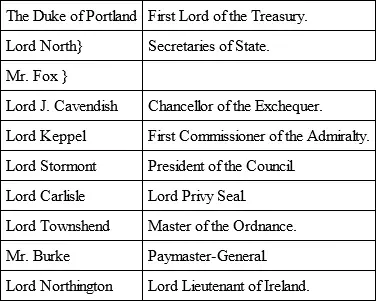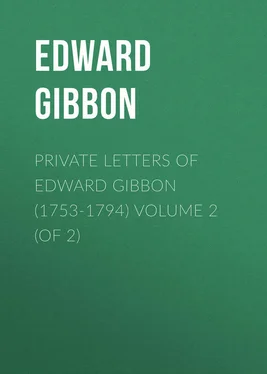Edward Gibbon - Private Letters of Edward Gibbon (1753-1794) Volume 2 (of 2)
Здесь есть возможность читать онлайн «Edward Gibbon - Private Letters of Edward Gibbon (1753-1794) Volume 2 (of 2)» — ознакомительный отрывок электронной книги совершенно бесплатно, а после прочтения отрывка купить полную версию. В некоторых случаях можно слушать аудио, скачать через торрент в формате fb2 и присутствует краткое содержание. Жанр: foreign_antique, foreign_prose, на английском языке. Описание произведения, (предисловие) а так же отзывы посетителей доступны на портале библиотеки ЛибКат.
- Название:Private Letters of Edward Gibbon (1753-1794) Volume 2 (of 2)
- Автор:
- Жанр:
- Год:неизвестен
- ISBN:нет данных
- Рейтинг книги:3 / 5. Голосов: 1
-
Избранное:Добавить в избранное
- Отзывы:
-
Ваша оценка:
- 60
- 1
- 2
- 3
- 4
- 5
Private Letters of Edward Gibbon (1753-1794) Volume 2 (of 2): краткое содержание, описание и аннотация
Предлагаем к чтению аннотацию, описание, краткое содержание или предисловие (зависит от того, что написал сам автор книги «Private Letters of Edward Gibbon (1753-1794) Volume 2 (of 2)»). Если вы не нашли необходимую информацию о книге — напишите в комментариях, мы постараемся отыскать её.
Private Letters of Edward Gibbon (1753-1794) Volume 2 (of 2) — читать онлайн ознакомительный отрывок
Ниже представлен текст книги, разбитый по страницам. Система сохранения места последней прочитанной страницы, позволяет с удобством читать онлайн бесплатно книгу «Private Letters of Edward Gibbon (1753-1794) Volume 2 (of 2)», без необходимости каждый раз заново искать на чём Вы остановились. Поставьте закладку, и сможете в любой момент перейти на страницу, на которой закончили чтение.
Интервал:
Закладка:
29
Probably William Eden, who had been secretary to the Earl of Carlisle during his Lord-Lieutenancy of Ireland. But he married Eleanor, daughter of Sir Gilbert Elliot, and sister of the first Earl of Minto. Eden, who was created Lord Auckland in the Irish peerage in 1789, was advanced to an English peerage in 1793, and died in 1814.
30
The reference probably is to the letter which Fox, before his resignation, wrote to the American agents in Paris, offering " to recognize the independence of the United States in the first instance, and not to reserve it as a condition of peace ." Fox interpreted this as an absolute recognition of American independence; Lord Shelburne and his colleagues held that it was a conditional recognition dependent on peace being concluded.
31
In September, 1780, Hyder Ali invaded the Madras district; Warren Hastings at once negotiated peace with the Mahrattas in order that he might send all available troops to Madras. Sir Eyre Coote defeated Hyder at Porto Novo (July 1, 1781) and at Pollilore (August 27). The full Treasury was the result of the recent overthrow of Cheyte Singh, Rajah of Benares, and the spoliation of the Begums of Oude. In the summer of 1782 the House of Commons resolved that it was the duty of the Court of Directors to recall Hastings. In compliance with this resolution the directors voted an order of recall, but afterwards rescinded it and maintained the Governor-General at his post. See note to Letter 487, on page 85 of this volume.
32
Sir George Augustus Eliott, created Lord Heathfield for his defence of Gibraltar.
33
Parliament, which had been prorogued to November 26, was further prorogued to December 5, in order that the negotiations for peace might be completed. Peace was provisionally signed with the United States at Paris on November 30, 1782.
34
Pitt's first meeting with Gibbon is thus described by Sir James Bland Burges, Bart. ( Letters and Correspondence , pp. 59-61). The dinner was given in Lincoln's Inn to the officers of the Northumberland Militia, who were quartered in the Inn during the Gordon Riots.
"I invited the four military gentlemen, our committee, and six other persons the best qualified I could meet with, among whom were my father, Lord Carmarthen, and Mr. Gibbon, the historian, who was then at the zenith of his fame, and who certainly was not at all backward in availing himself of the deference universally shown to him, by taking both the lead, and a very ample share of the conversation, in whatever company he might honour with his presence. His conversation was not, indeed, what Dr. Johnson would have called talk . There was no interchange of ideas, for no one had a chance of replying, so fugitive, so variable, was his mode of discoursing, which consisted of points, anecdotes, and epigrammatic thrusts, all more or less to the purpose, and all pleasantly said with a French air and manner which gave them great piquancy, but which were withal so desultory and unconnected that, though each separately was extremely amusing, the attention of his auditors sometimes flagged before his own resources were exhausted… He had just concluded, however, one of his best foreign anecdotes, in which he had introduced some of the fashionable levities of political doctrine then prevalent, and, with his customary tap on the lid of his snuff-box, was looking round to receive our tribute of applause, when a deep-toned but clear voice was heard from the bottom of the table, very calmly and civilly impugning the correctness of the narrative, and the propriety of the doctrines of which it had been made the vehicle. The historian, turning a disdainful glance towards the quarter whence the voice proceeded, saw, for the first time, a tall, thin, and rather ungainly-looking young man, who now sat quietly and silently eating some fruit. There was nothing very prepossessing or very formidable in his exterior, but, as the few words he had uttered appeared to have made a considerable impression on the company, Mr. Gibbon, I suppose, thought himself bound to maintain his honour by suppressing such an attempt to dispute his supremacy. He accordingly undertook the defence of the propositions in question, and a very animated debate took place between him and his youthful antagonist, Mr. Pitt, and for some time was conducted with great talent and brilliancy on both sides. At length the genius of the young man prevailed over that of his senior, who, finding himself driven into a corner from which there was no escape, made some excuse for rising from the table and walked out of the room. I followed him, and, finding that he was looking for his hat, I tried to persuade him to return to his seat. 'By no means,' said he. 'That young gentleman is, I have no doubt, extremely ingenious and agreeable, but I must acknowledge that his style of conversation is not exactly what I am accustomed to, so you must positively excuse me.' And away he went in high dudgeon, notwithstanding that his friend [Lord Sheffield] had come to my assistance."
35
Mrs. Siddons first appeared on the London stage in December, 1775, when she acted Portia at Drury Lane. She gained no great success, and in June, 1776, received her dismissal from the managers. In the provincial theatres, and especially at the Bath Theatre, then managed by Palmer, she became famous. At Bath, in 1780, she had twice acted the part of Lady Townly in Vanbrugh's and Cibber's play of The Provoked Husband . In 1782 she reappeared in London (October 10) at Drury Lane, in the part of Isabella in Southerne's tragedy of The Fatal Marriage . On October 30 she took the part of Euphrasia in Murphy's Grecian Daughter . On November 8 she played Jane Shore in Rowe's tragedy of that name. W. Hamilton's picture of Mrs. Siddons as Isabella belongs to the nation.
36
The "Hertford family" included Francis, first Earl and Marquis of Hertford; his brother, General Conway; his eldest son, Lord Beauchamp, M.P. for Orford; and his youngest son, William Conway, who was at this time standing at a by-election for Coventry.
37
The preliminaries of peace were signed at Versailles with France and Spain, January 20, 1783, and Parliament met, after the Christmas recess, January 21.
38
On Monday, February 17, 1783, an address of thanks to his Majesty for the peace was moved by Thomas Pitt, M.P. for Old Sarum, and William Wilberforce, M.P. for Kingston-upon-Hull. Amendments were moved by Lord J. Cavendish and Lord North, which were carried at 8 a.m. on Tuesday, February 18, by 224 to 208. On February 21, a resolution, proposed by Lord J. Cavendish, that the concessions made to the United States were excessive, was carried by 207 to 190.
39
On February 24, 1783, Lord Shelburne resigned office in consequence of the vote of February 21; and Pitt, as Chancellor of the Exchequer, publicly stated that he only retained his post till his successor was appointed. On March 24, Mr. Coke, M.P. for Norfolk, moved and carried an address to the king, asking for the appointment of a new administration.
40
Pitt, on March 31, resigned the office of Chancellor of the Exchequer. On April 2 the new administration was formed; the principal members were —

The Great Seal was put in commission. The first seven formed the Cabinet.
Lord Townshend said "he had always foreseen the Coalition Ministry could not last, for he was at Court when Mr. Fox kissed hands, and he observed George III. turn back his eyes and ears just like the horse at Astley's, when the tailor he had determined to throw was getting on him" ( Correspondence of C. J. Fox , vol. ii. p. 28).
Читать дальшеИнтервал:
Закладка:
Похожие книги на «Private Letters of Edward Gibbon (1753-1794) Volume 2 (of 2)»
Представляем Вашему вниманию похожие книги на «Private Letters of Edward Gibbon (1753-1794) Volume 2 (of 2)» списком для выбора. Мы отобрали схожую по названию и смыслу литературу в надежде предоставить читателям больше вариантов отыскать новые, интересные, ещё непрочитанные произведения.
Обсуждение, отзывы о книге «Private Letters of Edward Gibbon (1753-1794) Volume 2 (of 2)» и просто собственные мнения читателей. Оставьте ваши комментарии, напишите, что Вы думаете о произведении, его смысле или главных героях. Укажите что конкретно понравилось, а что нет, и почему Вы так считаете.












